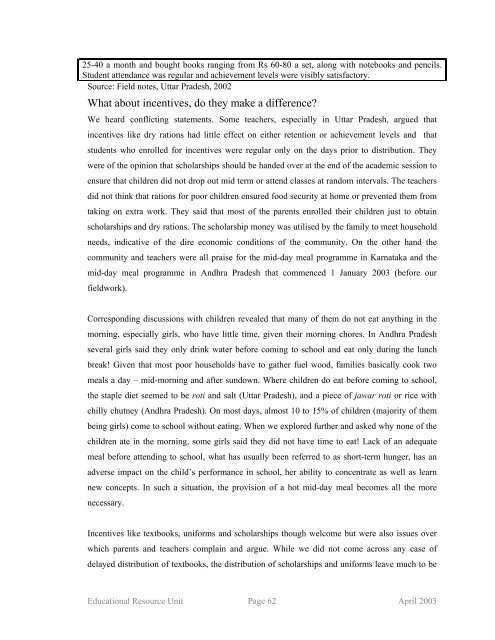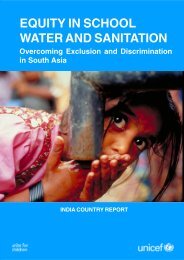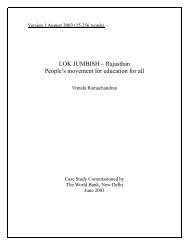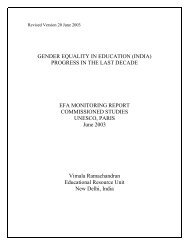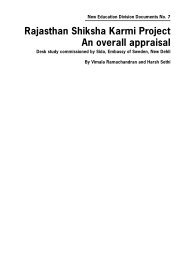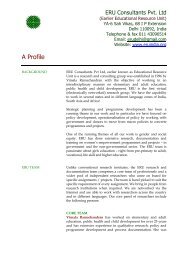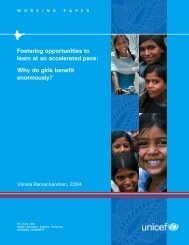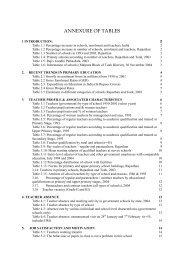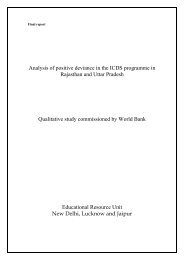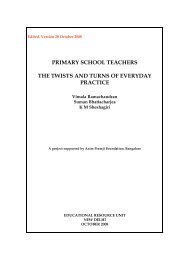Snakes and Ladders - ERU Consultants Pvt. Ltd.
Snakes and Ladders - ERU Consultants Pvt. Ltd.
Snakes and Ladders - ERU Consultants Pvt. Ltd.
You also want an ePaper? Increase the reach of your titles
YUMPU automatically turns print PDFs into web optimized ePapers that Google loves.
25-40 a month <strong>and</strong> bought books ranging from Rs 60-80 a set, along with notebooks <strong>and</strong> pencils.<br />
Student attendance was regular <strong>and</strong> achievement levels were visibly satisfactory.<br />
Source: Field notes, Uttar Pradesh, 2002<br />
What about incentives, do they make a difference?<br />
We heard conflicting statements. Some teachers, especially in Uttar Pradesh, argued that<br />
incentives like dry rations had little effect on either retention or achievement levels <strong>and</strong> that<br />
students who enrolled for incentives were regular only on the days prior to distribution. They<br />
were of the opinion that scholarships should be h<strong>and</strong>ed over at the end of the academic session to<br />
ensure that children did not drop out mid term or attend classes at r<strong>and</strong>om intervals. The teachers<br />
did not think that rations for poor children ensured food security at home or prevented them from<br />
taking on extra work. They said that most of the parents enrolled their children just to obtain<br />
scholarships <strong>and</strong> dry rations. The scholarship money was utilised by the family to meet household<br />
needs, indicative of the dire economic conditions of the community. On the other h<strong>and</strong> the<br />
community <strong>and</strong> teachers were all praise for the mid-day meal programme in Karnataka <strong>and</strong> the<br />
mid-day meal programme in Andhra Pradesh that commenced 1 January 2003 (before our<br />
fieldwork).<br />
Corresponding discussions with children revealed that many of them do not eat anything in the<br />
morning, especially girls, who have little time, given their morning chores. In Andhra Pradesh<br />
several girls said they only drink water before coming to school <strong>and</strong> eat only during the lunch<br />
break! Given that most poor households have to gather fuel wood, families basically cook two<br />
meals a day – mid-morning <strong>and</strong> after sundown. Where children do eat before coming to school,<br />
the staple diet seemed to be roti <strong>and</strong> salt (Uttar Pradesh), <strong>and</strong> a piece of jawar roti or rice with<br />
chilly chutney (Andhra Pradesh). On most days, almost 10 to 15% of children (majority of them<br />
being girls) come to school without eating. When we explored further <strong>and</strong> asked why none of the<br />
children ate in the morning, some girls said they did not have time to eat! Lack of an adequate<br />
meal before attending to school, what has usually been referred to as short-term hunger, has an<br />
adverse impact on the child’s performance in school, her ability to concentrate as well as learn<br />
new concepts. In such a situation, the provision of a hot mid-day meal becomes all the more<br />
necessary.<br />
Incentives like textbooks, uniforms <strong>and</strong> scholarships though welcome but were also issues over<br />
which parents <strong>and</strong> teachers complain <strong>and</strong> argue. While we did not come across any case of<br />
delayed distribution of textbooks, the distribution of scholarships <strong>and</strong> uniforms leave much to be<br />
Educational Resource Unit Page 62 April 2003


